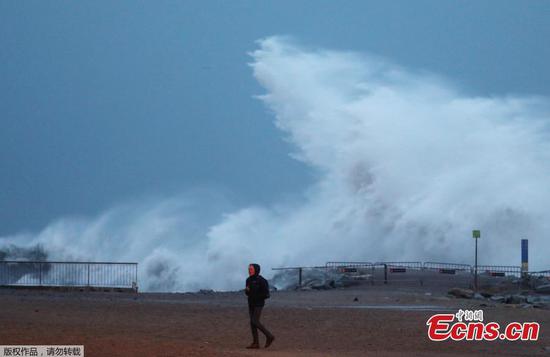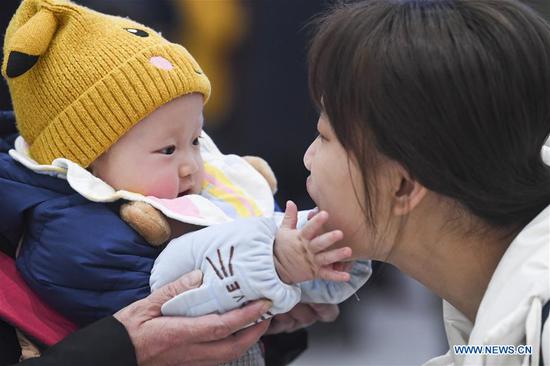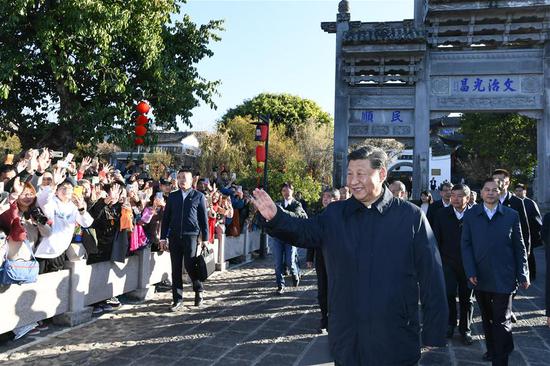
File photo: International Monetary Fund (IMF) Managing Director Kristalina Georgieva. (Photo/Xinhua)
The International Monetary Fund projected global growth to expand in the coming years due to good news on the United States-China trade front, Brexit and monetary policy.
The IMF, in an updated World Economic Outlook released on Monday in Davos, Switzerland, forecast global growth to increase from 2.9 percent in 2019 to 3.3 percent in 2020 and 3.4 percent in 2021.
Gita Gopinath, the IMF's chief economist, said that some risks mentioned in October's report have since partially receded with the announcement of a US-China phase one trade deal, the lower likelihood of a no-deal Brexit and the fact that monetary policy has continued to support growth and buoyant financial conditions.
"With these developments, there are now tentative signs that global growth may be stabilizing, though at subdued levels," Gopinath said at a news conference on Monday, the day before the opening of the World Economic Forum.
IMF Managing Director Kristalina Georgieva said that monetary easing has helped to stabilize the global economy, adding roughly 0.5 percent to global growth. But she added that a more comprehensive solution would be needed if global growth slows again.
"A coordinated fiscal response can boost growth," she said, while calling for a "spirit of cooperation".
"The reality is (that) global growth remains sluggish," Georgieva said.
Gopinath explained that the downward revision of global growth by 0.1 percentage point for 2019 and 2020 and 0.2 percentage point for 2021 from the October report is largely due to the downward revisions for India. She added that the subcontinent's growth slowed sharply owing to stress in the nonbank financial sector and weak rural income growth.
China's growth, on the other hand, has been revised upward from October by 0.2 percentage point to 6 percent for 2020 due to the recent US-China trade breakthrough.
Gopinath said the IMF expects China to slow slightly as years go by because of the structural adjustment China has to go through, referring to China's efforts to move away from exports to domestically driven growth.
She noted that there is still a lot more that needs to be done on the US-China trade front despite the phase one deal.
According to the IMF, the US-China phase-one deal, if durable, is expected to reduce the cumulative negative impact of trade tensions on global GDP by the end of 2020 — from 0.8 percent to 0.5 percent.
"We would hope the world moves toward a more open and sustainable trading system. We would hope there would be a more comprehensive deal between the US and China as the months go by," Gopinath said.
She said the IMF is concerned about risks returning on the trade front between the US and China as well as between the US and the European Union.
"Trade tensions and disruptions are something that we do put out there as an important risk," she added.
The IMF projected growth in advanced economies will slow slightly from 1.7 percent in 2019 to 1.6 percent in 2020 and 2021. It said that export-dependent economies like Germany should benefit from improvements in external demand, while US growth is forecast to slow as fiscal stimulus fades.
For emerging markets and developing economies, the IMF expects a pickup in growth from 3.7 percent in 2019 to 4.4 percent in 2020 and 4.6 percent in 2021, a downward revision of 0.2 percentage point for all three years from its October report.
The IMF said that a key imperative across all economies is to undertake structural reforms, enhance inclusiveness and ensure that safety nets protect the vulnerable.
Countries need to cooperate on multiple fronts to lift growth and spread prosperity. They need to reverse protectionist trade barriers and resolve the impasse over the World Trade Organization's appellate court, it said.
The IMF also suggested that a new international taxation regime is needed to adapt to the growing digital economy and to curtail tax evasion, while ensuring that all countries receive their fair share of tax revenues.
The US has threatened punitive tariffs on French wines and other products to retaliate for a digital services tax introduced by France last year. However, French President Emmanuel Macron and US President Donald Trump have agreed to extend negotiations on the dispute to the end of the year, postponing Washington's threat of sanctions against Paris, a French diplomatic source said on Monday.
The fact that the IMF upgraded its forecast of China's growth shows the international community's acknowledgment of China's economic performance and its confidence in the country's economic prospects, Foreign Ministry spokesman Geng Shuang said on Tuesday.
Geng quoted the latest statistics and said China's GDP grew 6.1 percent in 2019, ranking among the major economies seeing the fastest growth, and that its per capita GDP has exceeded $10,000.
Meanwhile, Geng said China's economic fundamentals will continue to develop for the better in the long run, adding that the country will stick to supply side reforms and actively push for the implementation of various measures to make sure its growth remains at a medium-to-high level.
Being the most powerful driver of the world economy, China will work not only to maintain its own growth, but for continued contribution to the global economy, he said.
Geng also said China will deepen reforms, be more open, stick to multilateralism and free trade and work with all parties for an open world economy and its balanced, sustainable and inclusive development.


















































